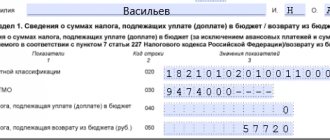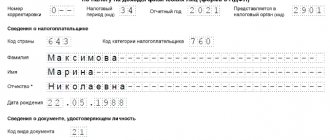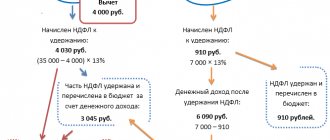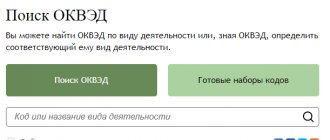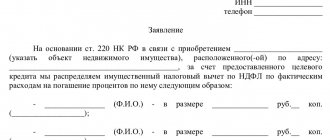“Children’s” deductions: to whom and how much
The procedure for applying standard deductions for personal income tax is regulated by Art. 218 Tax Code of the Russian Federation. The amount of the deduction depends on the type of child in the family. For the first and second child, the deduction amount is 1,400 rubles each. monthly. For the third and each subsequent child - 3,000 rubles. monthly.
The following are entitled to such a deduction:
- each of the parents (including divorced ones);
- the parent's spouse (i.e., the child's stepfather or stepmother);
- each of the guardians, trustees, adoptive parents (if there are several of them);
- each of the adoptive parents (if there are two of them);
- spouse of the adoptive parent.
The deduction is valid for each child, without exception, under the age of 18, as well as for each child under the age of 24, if he is a full-time student, graduate student, resident, intern, student or cadet.
There are also separate deductions for children who are disabled. The amount of the deduction depends on age and sometimes disability group. So, if a disabled child is under 18 years old, then the disability group does not matter. If the child is a full-time student, graduate student, resident, intern or student under the age of 24, then a deduction is possible if disability group I or II.
The size of the deduction depends on who receives it. If this is a parent, his spouse or adoptive parent, then the deduction is 12,000 rubles. per month for one child. For an adoptive parent, his or her spouse, caregiver and guardian, the deduction is 6,000 rubles. per month.
The “children’s” deduction is valid until the month in which income taxed at a rate of 13% on an accrual basis from the beginning of the year does not exceed RUB 350,000. From the month in which income exceeds 350,000 rubles, the deduction does not apply. If an employee has been working at his current place of work not since the beginning of the year, then the deduction should be provided taking into account the income received since the beginning of the current year at his previous job.
In the near future, the size of the “children’s” deductions will most likely increase. Bill No. 751335-7 is being considered, according to which they plan to increase the deduction to 2,500 rubles. for the first and second child, up to 3500 for the third and each subsequent child. For disabled children, the deduction amounts are planned to be set at 8,000 and 12,500 rubles. (depending on the status of the employee: parent, guardian, etc.) In addition, the bill proposes to increase the maximum level of employee income, from which the application of the “children’s” deduction ceases: up to 400,000 rubles.
Deduction amount
The amount of the deduction is established by subparagraph 4 of paragraph 1 of Article 218 of the Tax Code of the Russian Federation. To correctly determine its amount, it is necessary to line up the children according to their dates of birth. In this case, the first born child is the eldest of the children, regardless of whether a deduction is provided for him or not (letters of the Ministry of Finance of Russia dated June 16, 2016 No. 03-04-05/35117, dated February 26, 2013 No. 03-04 -05/8-133). So, for the first and second child the standard tax deduction is 1,400 rubles, for the third and each subsequent child 3,000 rubles.
A personal income tax deduction for a child is provided from the month of his birth (establishment of guardianship, trusteeship, entry into force of an agreement on the transfer of a child to a family) until the end of the year in which the child reaches the age limit; the month in which he turned 18 to 24 years old and stopped studying full-time (letter from the Ministry of Finance dated November 6, 2012 No. 03-04-05/8-1251); the month in which the employee lost the status of a guardian or trustee, including due to the child reaching 18 years of age.
note
350,000 rubles is the taxpayer’s income limit, above which the provision of monthly tax deductions ceases.
As a general rule, you can receive a deduction for children under the age of 18 inclusive. In this case, the period for receiving the deduction is extended until the child reaches 24 years of age, provided that he is a full-time student and is a student, graduate student, resident or intern (paragraph 12, subparagraph 4, paragraph 1, article 218 of the Tax Code of the Russian Federation, letters of the Ministry of Finance dated February 9, 2012 No. 03-04-06/5-28, dated December 16, 2011 No. 03-04-05/8-1051). If a child has taken an academic leave, a deduction for him is still due, this is stated in the letter of the Ministry of Finance dated March 10, 2016 No. BS-4-11 / [email protected] Since the standard tax deduction for personal income tax for a child is provided monthly until the month in which in which the employee’s income, calculated on an accrual basis from the beginning of the year, exceeds 350,000 rubles, it must be provided only when paying wages for the second half of the month in order to correctly determine whether the employee’s income on an accrual basis from the beginning of the year exceeded the limit amount or not. When providing a deduction to an employee who was not hired from the beginning of the year, his income received at his previous place of employment is taken into account, if in relation to this income he was provided with a deduction on the basis of a 2-NDFL certificate from the previous employer. If there is no 2-NDFL certificate, then “children’s” deductions for an employee hired not from the first month of the tax period are provided from the month he was hired and only in relation to income received in this organization (letter of the Ministry of Finance dated February 27, 2013 No. No. 03-04-05/8-154). The deduction is provided to parents, even if the child is fully supported by the state, this position was expressed by the Ministry of Finance in letter dated March 15, 2016 No. 03-04-05/141390.
Supporting documents for “children’s” deductions
“Children’s” deductions are provided on the basis of a written application drawn up in any form and supporting documents. This is what it says in paragraph 3 of Art. 218 Tax Code of the Russian Federation. However, it is not explained which documents must be submitted. In general, this is a copy of the child’s birth certificate (letter of the Ministry of Finance of the Russian Federation dated October 2, 2015 No. 03-04-05/56445).
But in practice, as a rule, more documents are required. The exact list of documents depends on the specific situation. For example, if a child is over 18 years old and is a full-time student, then an additional certificate from the educational institution must be submitted.
If an employee has not been working at his current job since the beginning of the year, he may be required to provide a certificate of income and tax amounts from his previous place of work. This is necessary so that the current employer can check whether the maximum income level at which the application of the “children’s” deduction ceases has been reached (paragraph 2, paragraph 3, article 218 of the Tax Code of the Russian Federation, letter of the Federal Tax Service of the Russian Federation dated July 30, 2009 No. 3-5-04 /1133).
Notarization of copies of documents confirming the right to a standard personal income tax deduction is not required. The Federal Tax Service of the Russian Federation draws attention to this in letter No. ED-4-3/8418 dated May 23, 2012.
Let's consider another question related to documents: how often do you need to write an application for deduction to the accounting department?
It depends on how it was composed. If it indicated the deduction period (for example, “I ask for a standard tax deduction during 2022”), then in order to receive the deduction in 2022, the employee will have to write a new application. But if the period for providing a deduction is not specified in the application and at the same time the employee’s right to a standard deduction is not terminated, then there is no need to re-fill the application. Such clarifications are given by the Ministry of Finance of the Russian Federation in letter dated May 31, 2019 No. 03-04-05/39733.
“Children’s” deductions if children are from different marriages
The right to a standard “children’s” deduction arises provided that the child is supported by a parent. This clearly follows from Art. 218 Tax Code of the Russian Federation. In a standard situation, when a child lives with his parents, no questions arise. But can, for example, the father of a child claim a deduction if the parents divorced and the child lives with his mother after the divorce?
Yes, maybe, if he pays alimony to his ex-wife (letter of the Ministry of Finance of the Russian Federation dated October 11, 2012 No. 03-04-05/8-1179). In this case, such an employee, along with the usual package of documents, must submit to the accounting department documents confirming the payment of alimony (letter of the Ministry of Finance of the Russian Federation dated November 7, 2018 No. 03-04-05/80099).
But not only the father can count on a deduction in this case. His new wife can also receive a deduction for her husband's child from a previous marriage. After all, property acquired by spouses during marriage is their joint property (Article 256 of the Civil Code of the Russian Federation and Article 34 of the Family Code of the Russian Federation). Including money that must be paid in the form of child support. It turns out that the spouses of people who pay alimony also participate in the maintenance of these children. This means they are also entitled to standard deductions. This conclusion is contained in letters of the Ministry of Finance of the Russian Federation dated August 10, 2016 No. 03-04-05/46762, dated March 18, 2015 No. 03-04-05/14392 and the Federal Tax Service of the Russian Federation dated September 17, 2013 No. BS-4-11/16736.
If the employee does not pay alimony, then he still has the right to a deduction if he helps his ex-wife with money and can prove this. For example, documents proving the fact of transferring money to support the child, a written statement from the ex-wife (mother of the child) that the child’s father is involved in providing for him (letter of the Ministry of Finance of the Russian Federation dated 03.03.2016 No. 03-04-05/12376).
Guide to the Standard Child Deduction
A selection of current problems when providing deductions.
How is the child tax deduction provided?
According to paragraphs.
4 paragraphs 1 art. 218 of the Tax Code of the Russian Federation, the standard tax deduction for each month of the tax period applies to the parent, spouse of the parent, adoptive parent, who support the child. A tax deduction is made for each child under the age of 18, as well as for each full-time student, graduate student, resident, intern, student, cadet under the age of 24.
Standard tax deductions established by paragraphs. 4 paragraphs 1 art. 218 of the Tax Code of the Russian Federation are provided to the taxpayer for each month of the tax period by reducing the tax base in each month of the tax period by the corresponding established amount of the deduction.
The tax base is reduced from the month of birth of the child (children) or from the month in which the adoption took place, guardianship (trusteeship) was established, or from the month of entry into force of the agreement on the transfer of the child (children) to be raised in a family until the end of that year, in in which the child (children) has reached the age specified in paragraph.
12 of this subparagraph, or the agreement on the transfer of the child (children) to be raised in a family has expired or been terminated early, or the death of the child (children).
Is a tax deduction provided to a parent if his child is in a boarding school?
When determining the tax base for personal income tax, taxpayers-parents who support their children have the right to receive a standard tax deduction.
The presence of children in a boarding school during their education does not mean that they are not supported by their parents. Accordingly, parents are entitled to the standard child tax credit on personal income taxes if they incur qualifying expenses to provide for the children. (see Letter of the Ministry of Finance of the Russian Federation dated November 9, 2018 No. 03-04-05/80485).
What documents can be used to confirm that a parent (parent’s spouse) is paying expenses to provide for the child?
In accordance with paragraph 3 of Art.
218 of the Tax Code of the Russian Federation, standard tax deductions are provided to the taxpayer by one of the tax agents who are the source of payment of income, at the taxpayer’s choice based on his written application and documents confirming the right to such tax deductions. Article 99 of the RF IC establishes that an agreement on the payment of alimony (the amount, conditions and procedure for paying alimony) is concluded between the person obliged to pay alimony and its recipient, and in the event of incapacity of the person obligated to pay alimony and (or) the recipient of alimony - between legal representatives of these persons.
By virtue of Art. 100 of the RF IC, an agreement on the payment of alimony is concluded in writing and is subject to notarization.
Failure to comply with the statutory form of the agreement on the payment of alimony entails the consequences provided for in paragraph 3 of Art. 163 of the Civil Code of the Russian Federation - its insignificance.
Based on the norms of the Tax Code of the Russian Federation and Letter of the Ministry of Finance of the Russian Federation dated January 15, 2019 No. 03-04-05/1233, the basis for providing a standard tax deduction to parents who do not pay child support by court decision, but have expenses for children, is an agreement to pay alimony.
The Letter of the Ministry of Finance of the Russian Federation dated November 7, 2018 No. 03-04-05/80099 states that documents to confirm the right to receive a standard tax deduction for children, in particular, can be copies of birth certificates of children, a copy of a passport (with a mark of marriage registration between parents) or a copy of the marriage registration certificate, a writ of execution (court order) for the collection of alimony or a notarized agreement on the payment of alimony, documents confirming the payment of alimony.
If a parent does not transfer child support on the basis of a court decision (on a writ of execution) or on the basis of a notarized agreement, while independently bearing the costs of maintaining the child, documents confirming the expenses incurred by him will be:
- copies of cash receipts, receipts, contracts issued to this person in favor of the child, etc.;
- documents confirming expenses for the child, including a written statement from the ex-wife (child’s mother) that the child’s father is involved in providing for him.
In general, a divorced parent can receive a standard child deduction if they can prove that they have paid child support (payment documents).
The employee’s application is accompanied by: copies of the child’s birth certificate, copies of a notarized agreement on the payment of alimony and copies of documents confirming the expenses incurred by him.
Thus, since the right to receive a standard tax deduction arises for the taxpayer, provided that the taxpayer is a parent and the child is supported by him, we believe that without a notarized agreement to pay child support, a standard tax deduction is not provided to such a person.
Based on the above, if the child’s father is divorced and does not actually live with the child, then documents to confirm his right to receive a standard tax deduction, in particular, may be:
- a copy of the child's birth certificate;
- certificate from the child’s place of study;
- documents confirming the fact of transfer of funds to support the child. Such documents may be payment documents (receipts for cash receipts, cash register receipts, payment orders, bank statements, etc.) confirming expenses incurred for the child;
- a written statement from the ex-wife (mother of the child) that the father is involved in providing for the children.
How is the child tax deduction provided to parents who are in an unregistered marriage?
With regard to the provision of a standard tax deduction in the event that the parents are in an unregistered marriage, in order to receive a standard deduction, the fact of registration of the marriage between the parents who support the child does not matter (letter of the Ministry of Finance of the Russian Federation dated May 30, 2011 No. 03-04-06/ 1-125, dated 08/12/2010 No. 03-04-05/5-448).
For example, with regard to an unregistered marriage, the Letter of the Ministry of Finance of the Russian Federation dated January 29, 2014 No. 03-04-05/3300 states that if paternity in relation to parents who are not married to each other was established in the manner prescribed by Art. 48 and 49 of the RF IC, for the purposes of applying the double standard tax deduction it does not matter.
Let us recall that according to para. 7 pp. 4 paragraphs 1 art. 218 of the Tax Code of the Russian Federation, a double tax deduction for personal income tax is provided to the only parent (adoptive parent), guardian, trustee. The provision of the specified tax deduction to the only parent ceases from the month following the month of his marriage.
From the Letter of the Ministry of Finance of the Russian Federation dated July 24, 2009 No. 03-04-06-01/192 it follows that the birth of a child to parents who are not in a registered marriage does not mean that the child does not have a second parent, that is, that the child has a single parent. Therefore, such cases do not fall within the scope of paragraph. 7 pp. 4 paragraphs 1 art. 218 Tax Code of the Russian Federation.
Thus, parents who are not married are entitled to a standard tax deduction if the child is supported by them while living with them, that is, they bear the costs of maintaining such a child.
The Letter of the Ministry of Finance of the Russian Federation dated November 7, 2018 No. 03-04-05/80099 states that the fact of cohabitation of a spouse with the child of the spouse from the first marriage can be confirmed:
- or a certificate from the place of residence of the relevant housing maintenance organization (Unified Information and Settlement Center);
- or a certificate from a homeowners association, housing or housing construction cooperative;
- or a certificate from the city settlement and rural administration, and can also be established in court.
An employee of the institution provided a certificate from the child’s place of study in April, and in the period from January to March the standard deduction was not provided. Can an employer provide a deduction from January?
According to paragraphs.
4 paragraphs 1 art. 218 of the Tax Code of the Russian Federation, an employee may be provided with a standard deduction for a child student, as well as for a child studying full-time, a graduate student, a resident, an intern, or a cadet under the age of 24. In accordance with paragraph 3 of Art. 218 of the Tax Code of the Russian Federation, standard tax deductions are provided to the taxpayer by one of the tax agents who are the source of payment of income, at the taxpayer’s choice based on his written application and documents confirming the right to such tax deductions.
One of the supporting documents for providing a standard tax deduction for each full-time student, graduate student, resident, intern, student, cadet aged 18 to 24 years is a certificate from an organization engaged in educational activities, which indicates the period and form of education of the child ( Letter of the Ministry of Finance of the Russian Federation dated 05/08/2018 No. 03-04-05/30997). This document must be requested from the employee every year, usually no later than September 1 (the usual start date of the new school year).
After receiving such a certificate, the tax agent has the right to provide a deduction, but only for those months that are included in the period of study at an educational institution.
An individual loses the right to receive the standard tax deduction in question from the month following the month the child graduates.
The Letter of the Ministry of Finance of the Russian Federation dated April 18, 2012 No. 03-04-06/8-118 states that the established paragraphs.
4 paragraphs 1 art. 218 of the Tax Code of the Russian Federation, standard tax deductions are provided to the taxpayer for each month of the tax period by reducing the tax base in each month of the tax period by the corresponding established deduction amount. Thus, an employee who submitted an application for a “children’s” deduction in March must submit it by recalculating the tax base and personal income tax from 01/01/2019, if he has been an employee since the beginning of the year and had the right to a deduction from the beginning of the year.
Hello Guest! Offer from "Clerk"
Online professional retraining “Chief accountant on the simplified tax system” with a diploma for 250 academic hours . Learn everything new to avoid mistakes. Online training for 2 months, the stream starts on March 1.
Sign up
“Children’s” deductions if a child starts his own family
Since in some cases the deduction is also given to an adult child (over 24 years old), a situation is likely when he starts his own family. Is the parent still entitled to the standard deduction? Officials from different departments give different answers to this question.
For example, in the letter of the Federal Tax Service of the Russian Federation for Moscow dated June 6, 2014 No. 20-15/055333, it is stated that a deduction for a child is provided regardless of the fact of the child’s marriage.
In letters of the Ministry of Finance of the Russian Federation dated March 29, 2019 No. 03-04-05/21857, dated March 17, 2016 No. 03-04-05/14853, dated March 31, 2014 No. 03-04-06/14217, the exact opposite position is given: after the child joins (including a student) a new family is formed by marriage, so he ceases to be supported by his parents, therefore, the taxpayer is not provided with a standard deduction for a child.
The position of the capital's Federal Tax Service seems to us more correct. In Art. 218 of the Tax Code of the Russian Federation there are no rules that prohibit giving a deduction if a child gets married. If, even after the marriage is registered, the parents continue to support the child, then the parents retain the right to a deduction. In addition, the employer is not obliged to check whether the employee’s child has started his own family. And an employee-parent is not obliged to inform his employer about the wedding of his son or daughter. Therefore, a joyful event should not interfere with receiving a “children’s” deduction.
Who is entitled to the double “children’s” deduction?
Sometimes workers are entitled to double the standard deduction. There are two such situations:
- when the employee is the only parent (adoptive parent, guardian, trustee);
- when the second parent refused the deduction in favor of the other.
Let's look at the first situation first. So, who is considered a “sole parent”? Not just someone who is raising a child alone (for example, due to divorce), but someone who can document the child’s absence of a second parent.
In turn, the absence of the second parent is his death or recognition (in court) as missing or deceased (letter of the Ministry of Finance of the Russian Federation dated February 15, 2016 No. 03-04-05/8123).
The only parent is also considered to be a mother whose child was born out of wedlock and paternity has not been legally established - the father is not indicated on the birth certificate, or information about the child’s father was entered based on the mother’s application (letter of the Ministry of Finance of the Russian Federation dated 02.02.2016 No. 03-04- 05/4973, dated 04/17/2014 No. 03-04-05/17637). But if she gets married, then from the next month after the marriage is registered, she is no longer entitled to a double deduction - regardless of whether the child is adopted by her spouse or not. This follows from paragraph. 13 pp. 4 paragraphs 1 art. 218 Tax Code of the Russian Federation.
Let's consider in what other cases an employee cannot be considered the only parent:
- when one of the parents is deprived of parental rights (letter of the Ministry of Finance of the Russian Federation dated 01.02.2016 No. 03-04-05/4293, Federal Tax Service of the Russian Federation dated 13.01.2014 No. BS-2-11 / [email protected] );
- when one of the parents evades paying child support and does not participate in the maintenance of the child (letter of the Ministry of Finance of the Russian Federation dated June 16, 2016 No. 03-04-05/35111).
Now let's consider the second situation in which the employee is entitled to a double deduction - this is when the second parent refused the deduction in favor of the other. But it's not that simple. A number of nuances should be taken into account.
Firstly, the refusal of the deduction must come from a parent who has the right to a “children’s” deduction, that is, having income taxed at a rate of 13%. If the mother does not have taxable income (for example, in connection with caring for a disabled child or being on parental leave), then she does not have the right to a deduction and she cannot refuse a deduction in favor of her spouse (letters from the Ministry of Finance of the Russian Federation dated 02/06/2018 No. 03-04-05/6880, dated 04/20/2017 No. 03-04-05/23946).
Secondly, if the “refusenik”’s income since the beginning of the year has exceeded 350,000 rubles, then he loses the right to the deduction transferred to his spouse. Accordingly, the other parent stops using the double deduction.
Thirdly, if the “refusenik” at the time of refusal of the deduction has income taxed at a rate of 13%, but then their receipt ceases (for example, due to dismissal and lack of work), then the other parent also ceases to enjoy the double deduction (letter Ministry of Finance of the Russian Federation dated December 14, 2018 No. 03-04-05/91182).
For these purposes, an employee receiving a double deduction must monthly bring to his accounting department a certificate of income from the second parent’s place of work. Such clarifications are provided in letters of the Ministry of Finance of the Russian Federation dated June 22, 2016 No. 03-04-05/36143, dated May 28, 2015 No. 03-04-05/30910. The courts also attach great importance to the fact of submitting a document confirming the receipt of taxable income by the other spouse (Resolution of the Administrative Court of the West Siberian District dated 12/09/16 No. F04-5705/2016).
To receive a double deduction, the employee must write an application for a double deduction, attaching the necessary documents, which include the other parent’s application to waive the deduction (letter of the Federal Tax Service of the Russian Federation dated November 3, 2011 No. ED-3-3/3636) .
Double Standard Child Tax Credit for 2017
The standard deduction for a child in 2022 is double (clause 4, clause 1, article 218 of the Tax Code of the Russian Federation):
- single parent (natural or adopted);
- the only adoptive parent;
- sole guardian;
- the sole trustee.
Current legislation does not define the concept of “sole parent”. But in letters dated June 16, 2016 No. 03-04-05/35111, dated July 3, 2013 No. 03-04-05/25442, etc., the Russian Ministry of Finance notes that a parent is recognized as a single parent if the child does not have a second parent , because he:
- died/declared dead;
- declared missing.
The guardian (trustee) is the only one recognized by the guardianship and trusteeship authorities (letter of the Ministry of Finance of Russia dated December 14, 2015 No. 03-04-05/72969). At the same time, even if the parents of the child under guardianship/ward are not deprived of parental rights, this does not in any way affect the amount of the deduction due to the sole guardian/trustee (letter of the Ministry of Finance of Russia dated 02/04/2013 No. 03-04-06/8-32).
Note that a “physician” cannot count on a double deduction as the only parent if the second parent:
- does not pay alimony (letter of the Ministry of Finance of Russia dated June 16, 2016 No. 03-04-05/35111);
- is not married to the first parent;
- deprived of parental rights (letter of the Ministry of Finance of Russia dated 02/01/2016 No. 03-04-05/4293, letter of the Federal Tax Service of Russia dated 09/02/2015 No. BS-3-11/).
The single parent loses the right to a double “children’s” deduction from the month following the month of marriage (clause 4, clause 1, article 218 of the Tax Code of the Russian Federation). After a divorce, the right to a double “children’s” deduction is renewed, but only if the former spouse did not adopt children (letter of the Ministry of Finance of Russia dated April 2, 2012 No. 03-04-05/3-410).
Also, one of the parents can receive a double deduction for a child in 2022 if the other renounces his right to a deduction in his favor. To do this, he must write a corresponding application. This opportunity can be used by natural or adoptive parents, but not by spouses of parents (natural or adopted), adoptive parents, guardians and trustees.
Note! Only those who have income subject to personal income tax at the rate of clause 1 of Article 224 of the Tax Code of the Russian Federation (13%) have the right to refuse a deduction in favor of their spouse. This is what the Russian Ministry of Finance thinks (letters: dated November 27, 2014 No. 03-04-05/60389, dated August 23, 2012 No. 03-04-05/8-997, dated November 30, 2011 No. 03-04- 05/5-968).
If there is no taxable income, then the right to a tax deduction does not arise, therefore the parent has nothing to refuse. Therefore, if the spouse:
- does not work;
- is on maternity leave or maternity leave;
- is registered with the employment center;
- is a non-working pensioner (for example, due to disability),
then you will not be able to transfer your right to a deduction to your second spouse.
Birth order of children for the purposes of “children’s” deductions
Since the size of the deduction is larger for the third child, many questions arise regarding the size of the “children’s” deduction and the order of birth of children.
For example, an employee has three children, but two of them are not entitled to a deduction due to their age. The question arises: should a deduction be given for the third child in the amount of 1,400 or 3,000 rubles?
In paragraphs 4 paragraphs 1 art. 218 of the Tax Code of the Russian Federation clearly states that 3,000 rubles are given for every third and subsequent child. And there is no condition that in order to receive an “increased” deduction for a third child in relation to older children, the employee must have the right to a deduction. Therefore, in a situation where the employee is no longer entitled to a deduction for older children due to their age, for the youngest the deduction amount will be 3,000 rubles. This conclusion is confirmed by the Ministry of Finance of the Russian Federation in letter dated April 17, 2014 No. 03-04-05/17619.
What if an employee has two children, and the first child died? In this case, although the youngest child is the second in the family, for the purposes of the deduction it will be considered the third, which means that in respect of him the employee will receive a deduction in the amount of 3,000 rubles. This conclusion is contained in the letter of the Ministry of Finance of Russia dated February 10, 2012 No. 03-04-06/8-33.
The birth order of children is determined by their dates of birth. In the cases under consideration, the accounting department must have copies of the birth certificate of all children (including those for whom a deduction is not provided due to their age or death).
Let's consider another situation. An employee in a new marriage has two children, but from a previous marriage he has one child for whom he pays child support. This employee receives deductions for all three children (for the third - in the amount of 3,000 rubles). His current wife also receives the same amounts.
But as soon as a child from a previous marriage turns 18, he ceases to be supported by his father and the payment of alimony stops. That is, the father and his new wife stop receiving a deduction for this child. For two children from a current marriage, the employee still receives 1,400 and 3,000 rubles. But his current wife is changing the amount of deductions for her own children. If earlier she received a deduction for them in the amount of 1,400 and 3,000 rubles, now her deduction will be 1,400 and 1,400 rubles. This conclusion is contained in the letter of the Ministry of Finance of the Russian Federation dated January 21, 2016 No. 03-04-05/1999.
2017 Standard Child Tax Credit Codes
At the end of each year, all tax agents for personal income tax report to the Federal Tax Service on the income received from them by taxpayers and on the amounts of tax withheld from this income. For this purpose, a certificate is provided in form 2-NDFL (approved by Order of the Federal Tax Service of Russia dated October 30, 2015 No. ММВ-7-11/).
This certificate is generated separately for each individual. In the document, in addition to data on income and personal income tax, the tax agent reflects information about deductions provided to the taxpayer, including for a child (section 4 of the 2-NDFL certificate). These deductions are designated by special codes approved by Order of the Federal Tax Service of Russia dated September 10, 2015 No. ММВ-7-11/.
Last year, changes were made to the current deduction codes (Order of the Federal Tax Service of Russia dated November 22, 2016 No. ММВ-7-11/). So, in particular, all standard child tax deduction codes 114-125 were replaced with new codes 126-145. In addition, there are more of them. Now the deduction code also depends on who it is provided to: the natural parent (spouse of the natural parent, adoptive parent) or the adoptive parent (spouse of the adoptive parent, guardian, trustee).
The updated codes for “children’s” deductions have been in effect since December 26, 2016. Therefore, when preparing 2-NDFL certificates for 2016, tax agents are required to use them.
All new standard child tax credit codes for 2017 are reflected in the table below.
| Deduction for a child under the age of 18, as well as for a full-time student (graduate student, resident, etc.) under the age of 24 to the parent, spouse of the parent, adoptive parent , who is supporting the child | |
| 126 | when provided for the first child |
| 127 | when provided for a second child |
| 128 | when provided for the third and each subsequent child |
| 129 | when provided for a disabled child under the age of 18 years or a disabled child of group I or II aged from 18 to 24 years |
| Deduction for a child under the age of 18, as well as for a full-time student (graduate student, resident, etc.) under the age of 24 for a guardian, trustee, foster parent, spouse of a foster parent who is supporting the child | |
| 130 | when provided for the first child |
| 131 | when provided for a second child |
| 132 | when provided for the third and each subsequent child |
| 133 | when provided for a disabled child under the age of 18 years or a disabled child of group I or II aged from 18 to 24 years |
| Double deduction for a child under the age of 18, as well as for a full-time student (graduate student, resident, etc.) under the age of 24 to a single parent, adoptive parent | |
| 134 | when provided for the first child |
| 136 | when provided for a second child |
| 138 | when provided for the third and each subsequent child |
| 140 | when provided for a disabled child under the age of 18 years or a disabled child of group I or II aged from 18 to 24 years |
| Double deduction for a child under the age of 18, as well as for a full-time student (graduate student, resident, etc.) under the age of 24 for the sole guardian, trustee, foster parent | |
| 135 | when provided for the first child |
| 137 | when provided for a second child |
| 139 | when provided for the third and each subsequent child |
| 141 | when provided for a disabled child under the age of 18 years or a disabled child of group I or II aged from 18 to 24 years |
| Double deduction for a child under the age of 18, as well as for a full-time student (graduate student, resident, etc.) under the age of 24 for one of the natural parents, if the other parent refused the deduction | |
| 142 | when provided for the first child |
| 144 | when provided for a second child |
| 146 | when provided for the third and each subsequent child |
| 148 | when provided for a disabled child under the age of 18 years or a disabled child of group I or II aged from 18 to 24 years |
| A double for a child under the age of 18, as well as for a full-time student (graduate student, resident, etc.) under the age of 24 for one of the adoptive parents, if the other adoptive parent refused the deduction | |
| 143 | when provided for the first child |
| 145 | when provided for a second child |
| 147 | when provided for the third and each subsequent child |
| 149 | when provided for a disabled child under the age of 18 years or a disabled child of group I or II aged from 18 to 24 years |
Is the right to a “children’s” deduction retained in the absence of income?
It happens that in certain months an employee does not have income subject to personal income tax (for example, due to being on long-term leave at his own expense or maternity leave). Is the right to a “children’s” deduction retained during “no-income” periods, and does the tax agent have to accumulate deductions and then provide them to the employee?
Situation 1.
At the beginning of the year, the employee had taxable income, but then the accrual and payment of taxable income stopped until the end of the year.
Under such conditions, deductions for “non-income” periods are not provided by the employer (letter of the Ministry of Finance of the Russian Federation dated October 30, 2018 No. 03-04-05/78020). However, an employee can obtain them independently through the tax office by submitting a 3-NDFL declaration there.
Situation 2.
In certain months of the calendar year, taxable income was absent, but appeared before the end of the year. In this case, deductions are “accumulated”, summed up, and then - when taxable payments arise this year - provided (letters from the Ministry of Finance of the Russian Federation dated December 25, 2018 No. 03-04-05/94556, dated February 15, 2018 No. 03-04-05/ 9654, dated 04.09.2017 No. 03-04-06/56583, Federal Tax Service of the Russian Federation dated 29.05.2015 No. BS-19-11/112, Resolution of the Supreme Arbitration Court of the Russian Federation dated 14.07.2009 No. 4431/09).
Special case of situation 2
: from the beginning of the year, an employee who has an employment relationship with the company had no taxable income, but then appeared (for example, an employee was on maternity leave, but left it within a year).
The same rules apply here as above: the right to deduct for previous months is not lost. However, regarding precisely this situation, the Ministry of Finance of the Russian Federation previously had a position that there is no deduction for “non-income” months (letters dated December 26, 2014 No. 03-04-05/67642, dated June 11, 2014 No. 03-04-05/28141). Officials believed that in this case the tax base for personal income tax should be determined not on an accrual basis from the beginning of the year, but starting from the month when the employee’s first income was accrued. The Supreme Arbitration Court of the Russian Federation clarified that this approach is illegal, since it does not follow from the Tax Code of the Russian Federation (Resolution No. 4431/09 dated July 14, 2009).
Situation 3.
There is no taxable income during the entire tax period, that is, the calendar year (for example, an employee is on maternity leave).
In this case, the employee does not have the right to a standard deduction (letter of the Ministry of Finance of the Russian Federation dated September 4, 2017 No. 03-04-06/56583, dated January 13, 2012 No. 03-04-05/8-10). This is explained by the fact that the tax base for calculating personal income tax in such situations is not determined in principle (for a specific year).

